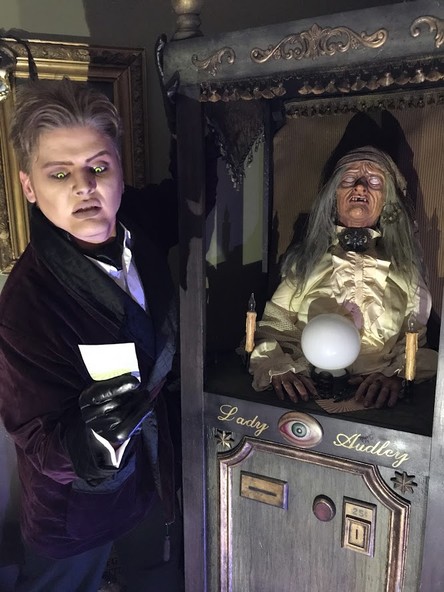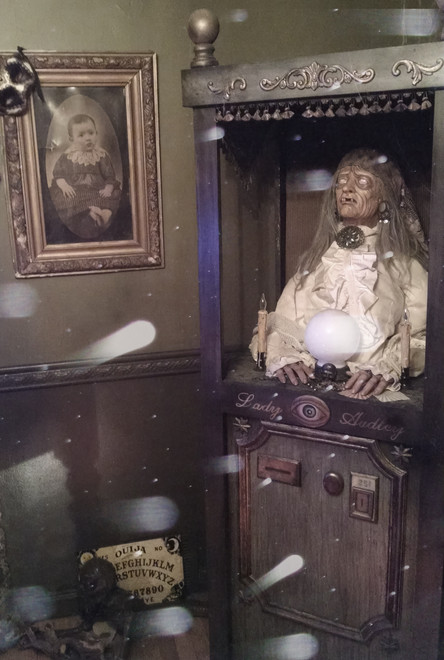Let Them Come To Me:
Why Fortune Telling Automata Are So Uncanny
and Why You'll Hereby Question the Humanity of Everyone You Encounter
It's technically impossible to separate an automaton fortune teller from the world of myth and dark fairy tales, not only because automata are from that world, but also because their makers were touched by stories that they heard or invented themselves and then tinkered and carved and clockworked their creations to open the eyes of their audience. The Devon Guild of Craftsmen has noted that "making automata is difficult. Making other sorts of three dimensional objects can also be hard, but the extra dimension of movement seems to add a disproportionate amount of difficulty. Moving parts involve principles (physics, not morals), levers, shafts, cranks, cams, springs, linkages, ratchets, drives and gearing. No wonder some of our makers have built whole, imaginary worlds around their pieces." [8] We would disagree that moral principles are not involved, but we can't scientifically prove that and so will let the point go.

Lady Audley is currently in the collection of Bruce Toriello, host of "Tales of Midnight."
|
Take just one look at the fortune telling automaton Lady Audley, and a dark story already begins to unfold. Her history has been traced back to a New Jersey boardwalk's penny arcade in the 1920s. From the very beginning, visitors sensed that Lady Audley had a life of her own. The cards she dispensed not only predicted the future but also seemed to know the present uncannily well. Lady Audley notoriously wouldn't respond to questions she felt were superfluous, and on occasion she would even volunteer information about subjects she felt important, without having been activated. One of the strangest rumors was that no one was ever seen refilling the fortune cards disepensed by the machine, which begged the question of where exactly they came from. In 1964, the boardwalk was set ablaze and nearly three dozen people were unable to escape. The arcade was the first to burn, and its sole survivor was Lady Audley. The arsonist turned out to be one of many who claimed to be held under her strange mystique. He felt a slave to her predictions and would travel nightly to the boardwalk, desperate to know what tomorrow might harbor. He eventually determined that the only way to break the spell was through the cleansing power of fire. When he discovered that Lady Audley survived the flames, he went into a blind rage and took a bullet in the heart by police detectives. A fortune card dispensed by Lady Audley was recovered from his pocket. It read, "From six chambers will come the stillness of life's regret. Four chambers in a cage will be broken but never will forget." If it sounds like something out of an urban legend, remember that the truth tends to be stranger than fiction. Lady Audley's history is likely not just stranger than we know but stranger than we can know.
Unlike the palm reader in Caravaggio's famous painting, who slyly slips off a querent's ring and so simultaneously reads and steals his fortune, an automaton behind glass cannot be a trickster. Indeed, the automaton behind glass does not cajole but rather sits still and quiet. If it embodies a motto, perhaps it is, "Let them come to me." The automaton does not and in fact cannot hawk superstition, nor can it make false claims. Gullibility or conviction is wholly upon the shoulders of those who would cross silver into the cabinet's coin slot. If the questions are self-centered, it is the querent who has trivialized the proceedings, not the automaton. If the prediction is laughed off, that's the querent's error and not the fortune teller's, for all oracles are true, as proven in Marie-Louise von Franz's On Divination and Synchronicity: The Psychology of Meaningful Chance (1980). If the consultation is to be called a folly, recall that word's French meaning, "delight," and that foolishness is "wooden-headed" (reiterating that an automaton puts on no airs). If one would call the consultation anything, perhaps it should be deemed a sin, for that is to imply that the automaton can reveal what God has wisely concealed and expressly forbidden, and what higher tribute could a fortune teller receive?

The Lady Audley automaton seemingly attracting ghostly orbs, as revealed by our custom "Uncanny Detector" app (seen in operation in our video about exploring a ruined wizard's museum.)
|
Lady Audley negotiates a boundary between rational mechanism and legendary magic and thereby speaks of a double world. [2] "The hard border between the natural and the artificial evaporates when machines are animated with life." [3] She sits within a booth, the glass panels suggesting the hazy fringe between life and nonlife, the human and spirit worlds, possibility and probability, old wives' tales and unvarnished truths. For all her answers, Lady Audley's "undecidables and ambiguities" [4] spark even more questions … about her own cognitive autonomy, her immortality, her accountability, her imprisonment. [1] Is she walled in, or are we? Does she act mechanically, or do we? Is she unsettling, or is there strangeness in everyday life? [5] Indeed, the automaton that tells our fortune is uncanny not for its weirdness or otherness but, as Freud described, for its familiarity.
In the lingo of information science, "every automaton has a nonempty set of fair behaviors." [7] That word "nonempty" is fascinating, for it's not quite the same as "full." Non-emptiness sounds like the opposite of Zen enlightenment, and it implies a transcendent state of release from death and rebirth that yet escapes utter annihilation. One recalls the "unpeopled space with presence" of Denise Levertov. [9] "Nonempty" also recalls the "not zero" concept of fuzzy logic. A card-offering automaton may "not be playing with a full deck," as the idiom goes, but neither is it an empty deck or a zero-sum. That other word, "fair," is also crucial. It means unbiased and trustworthy.
Then there's this question: is Lady Audley inhuman, and how can we know who isn't? For to call Lady Audley an automaton is to introduce a disquieting implication, since anyone else we encounter could be a perfected automaton, an android, a golem, or some other alien impersonator of the human. As Stanley Cavell has rationalized in The Claim of Reason (1979), "Obviously, you can never be certain that other human beings exist, for any one you single out may, for all you know, be something other than you imagine, perhaps a human, probably a human if you like, but possibly a mutation, and just possibly an automaton, a zombie … The world is what it is. And whatever it is, so far as you take it as inhabited by candidates for the human, you are empathetically projecting. This means that you cannot rule out the non-human (or human non-being) possibility."
More than a fortune teller, is Lady Audley a votive object, a prophylactic talisman, a promise, a petition, or a phantom? [2] Is she haunted or a projection of our own haunted selves?
And can every single one of these admittedly profound questions be answered for merely a quarter? A quarter is half of a half, and it's one of the thousand paradoxes: "you can slice something into forever, halving" [6].
Notes:
1 Thanks to Michael Davidson in "Attended with Trouble," The Fate of Difficulty in the Poetry of Our Time, 2017
2 Thanks to Elizabeth King in "Perpetual Devotion," Genesis Redux: Essays in the History and Philosophy of Artificial Life, 2010
3 Richard Hardack, Not Altogether Human: Pantheism and the Dark Nature of the American Renaissance, 2012
4 Julian Wolfreys, Victorian Hauntings: Spectrality, Gothic, the Uncanny and Literature, 2001
5 Thanks to Katie Model, "Gender Hyperbole and the Uncanny in the Horror Film: The Shining," 2012
6 Elana Dykewomon, Risk, 2012
7 Proceedings of the Conference on Information Sciences and Systems, 1988
8 P. de Burlet, "Tall Stories," The Devon Guild of Craftsmen, 2010
9 Denise Levertov, "A Ring of Changes," With Eyes At the Back of Our Heads, 1959




